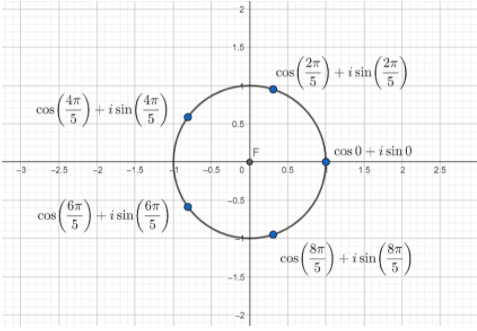Question
Question: By considering the roots of \({{z}^{5}}=1\), how do you show that \(\cos \left( \dfrac{2\pi }{5} \ri...
By considering the roots of z5=1, how do you show that cos(52π)+cos(54π)+cos(56π)+cos(58π)=−1?
Solution
In this problem we need to prove the given equation by using the given value z5=1. First, we will write the value 1 as a complex number i.e., cos0∘+isin0∘. Now we will calculate the value of z5 and we will use the De moivre’s theorem. After applying De moivre’s theorem we will calculate the roots of the given equation by substituting the various values for n. Now we will plot the roots on a graph paper and from graph paper we can write the sum of the roots as 0. So, we will sum the obtained roots and equate it to zero and simplify the obtained equation to get the required result.
Complete step by step answer:
Given that, z5=1.
We can write the above value as
⇒z5=1=cos0∘+isin0∘
According to the de moivre’s theorem we can write the value of z as
⇒z=(z5)51⇒z=cos(52nπ)+isin(52nπ)
For the above equation we can have five roots, which are obtained by substituting n=0,1,2,3,4, then we will get
If n=0, then the root is
z=cos(52π×0)+isin(52π×0)⇒z=cos0+isin0
Similarly, for n=1,2,3,4 we will get the roots as cos(52π)+isin(52π), cos(54π)+isin(54π), cos(56π)+isin(56π), cos(58π)+isin(58π).
Now plotting the all the roots, we have in a graph paper, then we will get

We can observe that all the points are forming a circle with unit radius with origin as centre. So, the sum of the roots is equal to zero. Considering the real part of the roots and equating their sum to zero, then we will get
1+cos(52π)+cos(54π)+cos(56π)+cos(58π)=0
Simplifying the above equation, then we will have
⇒cos(52π)+cos(54π)+cos(56π)+cos(58π)=−1
Hence proved.
Note: In this problem they have only asked to show that cos(52π)+cos(54π)+cos(56π)+cos(58π)=−1. But we can also have another equation when we consider the imaginary part after drawing the graph. If we equated the sum of imaginary part to zero, then we will get
0+sin(52π)+sin(54π)+sin(56π)+sin(58π)=0⇒sin(52π)+sin(54π)+sin(56π)+sin(58π)=0
